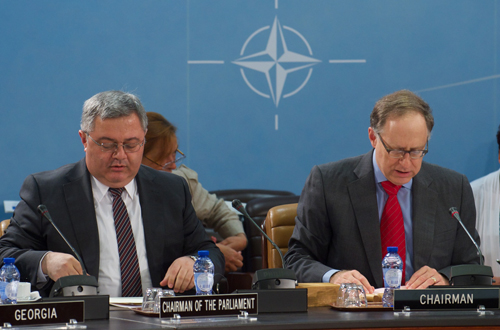
Georgian Parliament Speaker Davit Usupashvili (left) and NATO Deputy Secretary General Alexander Vershbow (right) at a meeting of NATO-Georgia Commission in Brussels, July 22, 2015. Photo: NATO
Parliament speaker Davit Usupashvili said that Georgia wants more from NATO to speed up country’s integration into the Alliance.
He made the remarks on July 22 after meeting with NATO Deputy Secretary General Alexander Vershbow in Brussels, where he also addressed diplomats from the Alliance member states in frames of the NATO-Georgia Commission.
“I told our partners very clearly, unequivocally that Georgia is ready for more and that Georgia believes more is needed to be done,” Usupashvili said in an interview with the Georgian public broadcaster on July 22.
“On this issue we work both individually with NATO-member states and with NATO as a whole. Many NATO-member states are willing to make more clear steps – be it towards MAP [Membership Action Plan] or even more, and there are states, which need more arguments and with whom more work is needed in order to make them believe that speeding up of Georgia’s NATO integration poses no threat to stability in the region and to their security,” he said.
“We need serious work in this regard… and we should continue it; it requires work, instead of vocal statements and irresponsible actions – that’s the only policy, which is in line with NATO,” Usupashvili said.
He also said that NATO diplomats encouraged Tbilisi to keep format of direct dialogue with Moscow involving meetings between Georgian PM’s special representatives for relations with Russia Zurab Abashidze and Russia’s Deputy Foreign Minister Grigory Karasin; opposition UNM and Free Democrats (FD) parties are calling the government to scrap this format; UNM says that this format creates “false impression” of normalization of bilateral relations with Russia and FD says the format has “exhausted itself”.
“One of the issues I was asked [by NATO diplomats at a meeting of NATO-Georgia Commission] was whether the Georgian government really plans to scrap Abashidze-Karasin format – they hear such statements from Georgian politicians; they believe that if it happens and if the government cuts this small, not so efficient, but necessary link of relation with Russia, our efforts in respect of joining NATO and gaining MAP will become more difficult, because Georgia’s NATO membership as well as granting Georgia MAP is not design by the member states for entering into new conflict with Russia – that’s not the case,” Usupashvili said.
“Georgia should maintain what has been achieved in recent years, when we managed moving forward towards our strategic goal without creating additional problems to our own country and when others create additional problems to us, we try to solve it through the same means which is our strategic goal – with the support of our international organizations and our partners,” he said.
NATO Secretary General Jens Stoltenberg is expected to visit Georgia next month.
“In a meeting of the NATO-Georgia Commission, Allied ambassadors welcomed good progress on the Substantial NATO-Georgia Package, which aims to help Georgia strengthen and develop its forces and defence ministry,” NATO said in a press release on July 22.
“Allies thanked Tbilisi for its major contributions to NATO missions and operations, which have further developed Georgia’s ability to work seamlessly alongside Allied forces. Georgia is currently the second largest contributor to the Resolute Support mission in Afghanistan,” it said.
“The Deputy Secretary General and Allied ambassadors commended Georgia for its considerable reforms, and encouraged the country to continue its efforts. Given recent developments on the Administrative Boundary Lines of the South Ossetia region of Georgia, Ambassador Vershbow further made clear that Allies fully support Georgia’s territorial integrity within its internationally-recognised borders,” NATO said.
This post is also available in: ქართული (Georgian) Русский (Russian)
